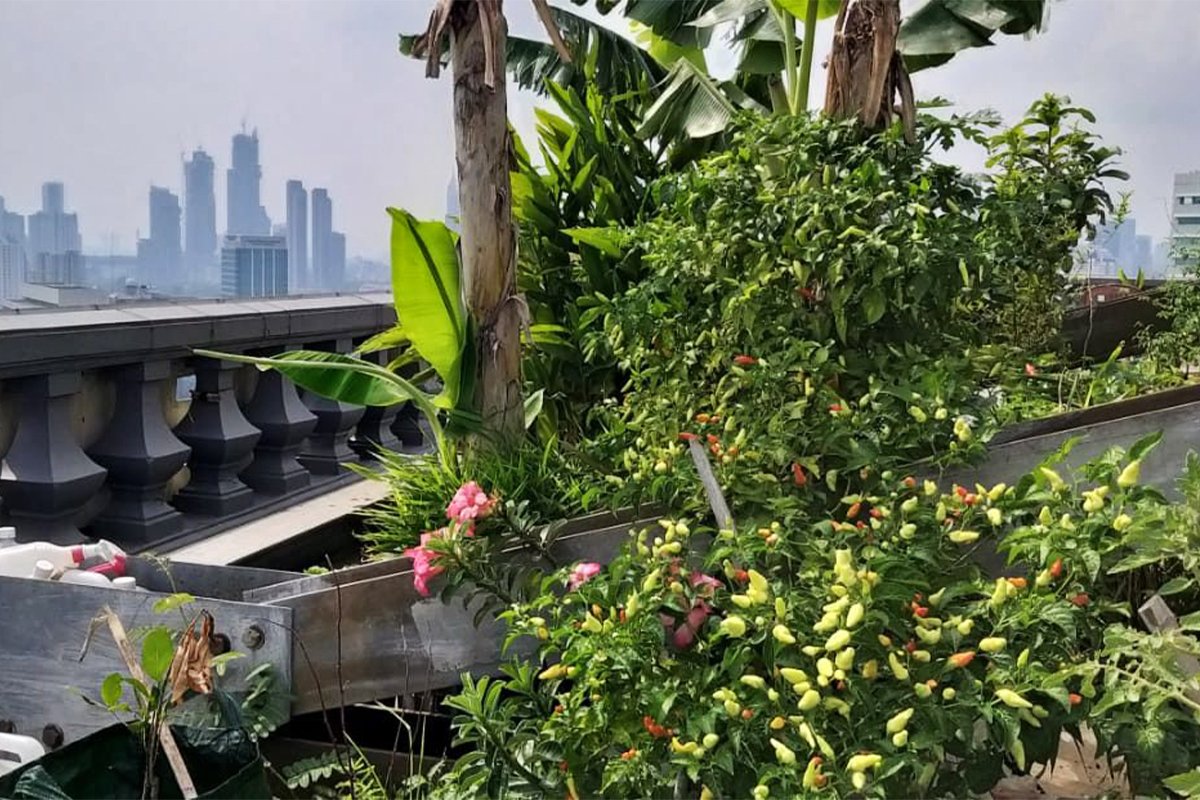- Grassroots initiatives in several Indonesian cities have sprung up aimed at achieving food security through urban and family farming.
- Proponents say this is a great way to diversify food variety and cushion the impact of rising food and commodity prices.
- They also tout its ecological benefits, including lower emissions and healthier soil than with commercial farming.
MEDAN, Indonesia — Food plants intermingle on the second-floor rooftop of a house in Medan, the biggest city on the Indonesian island of Sumatra.
They were planted by Sakiah Nasution, who took up urban farming about a year ago amid the COVID-19 pandemic.
In her open-air garden, measuring 2 by 3 meters (7 by 10 feet), she grows chili peppers, cauliflowers, Brazilian spinach, tomatoes, lettuce, Japanese mustard greens, cucumbers, honey chayotes, turmeric and ginger, all without pesticides. It lowers her monthly food bill and gives her a chance to commune with nature.
“The silver lining from COVID is that urban farming became part of the healing process at home,” said Sakiah, a lecturer in agriculture at a local university and mother of three.
“I grow it for my daily needs. Some of the greens I don’t even have to buy at the market anymore,” she said.
The war in Ukraine, one of the world’s leading grain exporters, has fueled rising food prices globally, including in Indonesia, a major grain importer, giving people like Sakiah extra incentive to cultivate food crops on her rooftop.
Before the start of the war in February, a pack of Indomie instant noodles cost 2,400 rupiah (16 U.S. cents). It now sells at grocery stores in Jakarta for 3,200 rupiah (21 cents), a 33% increase.
Chili peppers, a local staple, normally sell for 40,000 rupiah per kilogram ($1.22 per pound) in Jakarta, but the price tripled to 120,000 rupiah in April, prior to the Eid al-Fitr holiday at the end of the Muslim holy month of Ramadan. The price only returned to the lower level in August.
In Medan, chili peppers rose to as much as 60,000 rupiah per kilo ($1.82/lb). Along with shallots and garlic, chilis are a perennial ingredient in Indonesian cooking, but their prices can shoot up when there’s a supply shortage or a bad harvest.
Prices of rice, the main staple for many Indonesians, have been stable over the past year, at about 165,000 rupiah ($11.20) for a 10-kg (22-lb) sack of quality rice. The stability is partly due to Indonesia producing surplus rice over the past three years, an achievement for which the head of the International Rice Research Institute presented President Joko Widodo with a plaque in Jakarta on Aug. 15.
“Chili peppers, tomatoes, cauliflowers and other leafy vegetables we plant by rotation to avoid a pest explosion,” said Sakiah, who also battles strong winds and hard rain on her rooftop garden.
She said she’s concerned about the environment and is into planting organic vegetables at home. Her efforts have also inspired her neighbors, who have followed suit.
An island away, in Garut district, West Java province, Nissa Wargadipura said the move toward urban farming can also be a “revolutionary movement” in family farming.
“Land is immovable. But humans can move it for their sustenance,” said Nissa, founder of the Ath-Thaariq ecological Islamic boarding school in Garut and recipient of an award for ecofriendly farming in 2018.
Nissa said family farming is a pillar of food necessity in Indonesia as it can meet household needs. There can be variety although on a small scale with polyculture farming, not monoculture, as is the norm with commercial farming.
When citizens apply the principles of polyculture farming, then the needs in a given community can be met with households sharing the responsibility for growing different types of vegetables.
The Ath-Thariq ecological boarding school applies a learning system in ecology-based agriculture with a focus on food sovereignty.
Nissa’s boarding school has a 1-hectare (2.5-acre) zone that’s split up for various purposes. There’s an area dedicated to forestry, others for aquaculture, rice growing, seed storage, animal husbandry, single-season food plants, and long-term planting. In all, they grow 450 different types of plants.
“What do we do with it? For now it’s for the 30 families managing it. Some is [sold] as an additional source of livelihood,” she said.

Hayu Dyah Patria, a food technology specialist and community outreach worker with the Mantasa Institute, said urban farming can be one means to overcoming the climate crisis. Hayu founded Mantasa in Gresik, East Java, in 2009, with the aim of developing wild edible plants to tackle malnutrition in Indonesia.
Healthy soil is key in ecological agriculture, especially in small-scale farming at home and in the city, she said. A major issue now, she said, is the rise in nitrogen concentration in the atmosphere, a contributor to global warming.
This increase in nitrogen is due to human activity, particularly the use of industrially produced nitrogen-based fertilizers for monoculture farming, Hayu said.
She said studies have shown monoculture farming is one cause of high nitrogen volume. To tackle this, the soil must be improved.
Damaged soil can’t “fix” nitrogen, or bind it with other chemicals, which leaves more of the gas circulating freely in the atmosphere. Good soil, though, can fix nitrogen in the earth, where, as a compound with other elements, it’s crucial for plant growth.
“One easy way to fix nitrogen from the air is by planting nuts and applying polyculture farming,” Hayu said. “If every household can have its own food garden, then food sovereignty can be reached.”
To attain food sovereignty, it’s important to apply the principle of ecological agriculture that centers on healthy soil. This allows for nutrition-rich vegetables and fruit to grow. Healthy soil helps address the climate crisis, Hayu said.
This is very possible with small-scale farming, she added. Also, ensure that seeds are organic and local, and not manufactured hybrid seeds, she said.
In addition, people should try to identify the wild food plants near where they live, such as purslane (Portulaca oleracea), woodnettle (Laportea aestuans), fireweed (Crassocephalum crepidioides), and amaranth (Amaranthus palmeri).
“They’re high-nutrition food but people have long disregarded them,” Hayu said.
A version of this story was reported by Mongabay’s Indonesia team and first published here on our Indonesian site on July 15, 2022.











